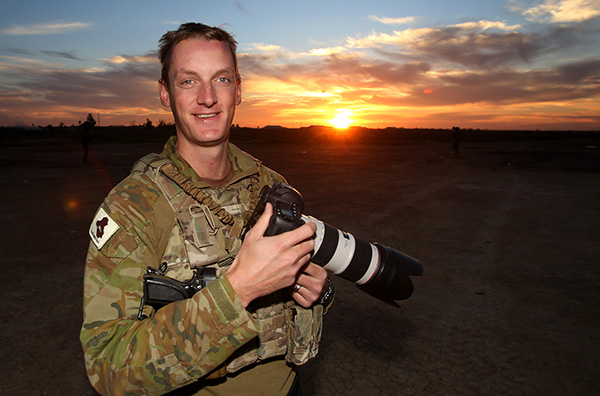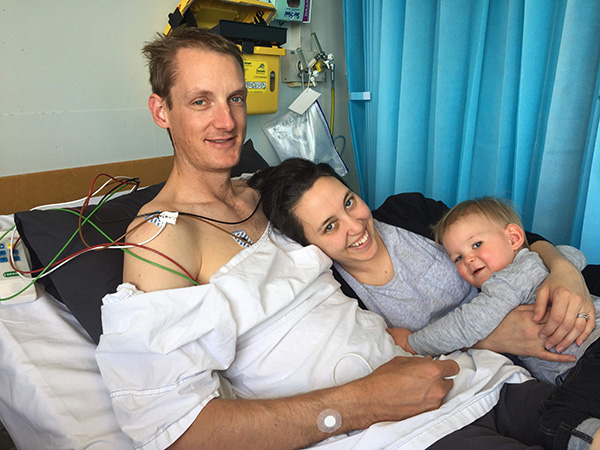Soldiering on after stroke
My name is Jake Sims, I’m an Australian Army photographer and it is easily the best job in the world. I capture moments in time reflecting the important work of our military at home and abroad – from training, to the front line and everything in between. I’ve been in the army for thirteen years and it is a huge part of who I am.

I am also a bit of an adrenalin junkie with a passion for snowboarding and the mountains. I’m fit, healthy and love the outdoors. My biggest joy is my family – my wife Liz, baby Eleanor and two year old son Hugo. They are my everything.
I do not take any of these things for granted, especially after a stroke almost claimed my life two years ago.
I remember walking through a busy airport when I saw stars. It was a weird sensation and I started to lose my vision. I thought I was getting a migraine, so I told my mates I’d meet them at the gate and veered away to grab a bite to eat to see if it made me feel any better. But as I went to walk away, my legs became heavy. It was a struggle to lift one foot in front of the other. A feeling of impending doom washed over me. I managed to call Liz, but by this point I was slurring my words. I hit the deck. Hard.
My friends came to my aid. I had an out of body experience where I was looking down on myself as a friend helped me vomit in a bin. I could see my limbs were floppy. The next thing I knew I was in acute care in hospital.
Despite my symptoms, which in hindsight all point to a stroke, it took 36 long hours for an official diagnosis. I was a healthy 30 year old man after all. The news came as a complete shock.
My diagnosis and those first two weeks after the stroke were the lowest point for me. I’m not good at being cooped up and staying still at the best of times, but I had no energy and my mind was wandering.
I feared for my future. I didn’t know if I would be able to support my family. Little Hugo was only four months old at the time. What would my stroke mean for him? Would I be able to play with him and see him grow? What impact would my stroke have on my career – would I be able to return to the job I loved so much? My eyesight was affected by my stroke and as a photographer vision is vital.
I spent seven years in the infantry and seven as a photographer and even though there were moments of danger, I had control of those situations to some extent. But stroke was different. It felt like I had no control of my destiny.
Throughout everything Liz has been my rock, one hundred percent. She constantly reassured me everything would be okay and we would get through it together. If I could not return to the person I was, it didn’t matter. I was alive.
Thinking back it was an exhausting time for Liz. Not only was she caring for me, she was dealing with all the challenges of being a first-time mum, essentially on her own. She was sleep deprived herself, but never once complained if I needed to sleep for twenty hours straight due to fatigue.
Rehab was the key to my recovery. It helped me get control back and I threw everything I had into it. I’d read that if you work hard in the first six months after stroke it will give you the best chance of recovery, so that’s what I did. My drive and determination came down to a combination of my personality traits and my army training. The army teaches you to push your self to the limit physically and mentally. It teaches you to be your best and that if you put your mind to it you can achieve almost anything. So I kept pushing in rehab, even when it hurt. Especially when it hurt.
As my strength improved, I was desperate to get back out on the snow. My doctor warned me I would probably be disappointed as I still had bad balance on my right side, but I had to give it a crack. He was right in a way. I spent the day on my bum, but it was fun to be in the fresh air on a mountain again and it was an enormous incentive to keep trying to get back to my physical best.
The true turning point for me in my recovery was another snowboarding trip a few months later. I headed to the back country and absolutely nailed a really challenging jump. I didn’t think I would be able to land it, but when I did the euphoria made me realise I could do anything. I was back.
My message to anyone else recovering from stroke is while you may not want to leap down mountains like me, keep pushing to achieve your goals. It might be picking up a cup or walking ten paces. Keep working at it.
My stroke has reinforced my commitment to making the most of life. We now have another addition to the family and I was fortunate to be able to gradually return to work.
I am a big advocate of living life to the fullest. You never get today back.

